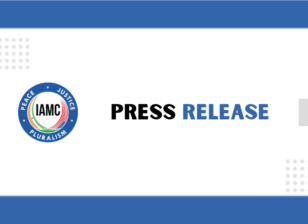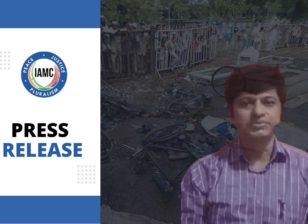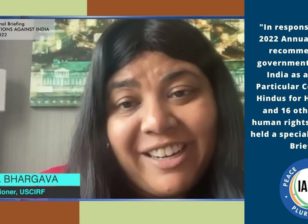Indian judiciary is complicit in systemic violence and discrimination against minorities: Congressional Briefing
FOR IMMEDIATE RELEASE
Washington, DC (March 25, 2022) – Far from upholding the democratic values of justice and impartiality, the Indian judiciary is complicit in allowing India’s ruling Bharatiya Janata Party (BJP) and its Hindu extremist supporters to lay the ground for a genocide of India’s 200 million Muslims, prominent human rights activists and lawyers said at a Congressional Briefing.
“The Indian Judiciary is being used as a puppet machinery by the Modi regime to ensure that the voices of truth and dissent are shackled and silenced,” said Pranay Somayujala, Advocacy and Outreach Coordinator for Hindus for Human Rights.
“[This] poses a unique challenge given the inherent conflict of interest. The state is prosecuting the state, and by extension every officer of the prosecuting state possibly is undertaking every effort to ensure the acquittal of accused officers of the state,” said senior journalist and human rights defender Teesta Setalvad.
“The behavior of the judiciary, all the up from the trial court to India’s Supreme Court, has not inspired confidence in the autonomy and independence of the judiciary,” said Dr. Mike Ghouse, founder-president of the Center for Pluralism.
“Courts in India have historically given a wide latitude to state agencies to arrest and incarcerate people in the name of ‘national security’ concerns, especially when those being accused come from minority or marginalized communities… A more recent worrying phenomenon has been its tactic of delay and virtual abrogation of responsibility in matters concerning the political agenda of the ruling party,” said Fawaz Shaheen, an India-based human rights attorney.
“If the Supreme Court of a country is refusing to actually restore the constitutional rights [and] denies people their fundamental rights, which court will we go to?” said Kavita Srivastava, a veteran human rights activist in India. “International accountability needs to be brought towards the government of India and also expose what is happening through the Supreme Court.”
Speakers discussed several different cases where the Indian judiciary failed its minorities due to being compromised by the influence of the BJP, which is at the forefront of India’s dangerous Hindu supremacist movement.
“In 1979, India ratified the International Covenant on Civil and Political Rights. Article 18 affirms that everyone shall have the right to freedom of thought, conscience, and religion,” said Dr. Ellen Kennedy, founder and Executive Director of World Without Genocide. However, she added, court-approved policies such as the discriminatory Citizenship Amendment Act and the National Registry of Citizens have been “a license for anti-Muslim violence.”
“These two current policies violate International human rights laws and norms. India is subject to the standards set in United Nations documents because India is party to these covenants and declarations,” Dr. Kennedy said. “Many people hoped that the Supreme Court, when faced with 143 challenges to the Citizenship Amendment Act, would order a temporary stay; the Court did not… India’s Supreme Court [also] ordered the state of Assam to complete a National Registry of Citizens.”
When breaking down the discriminatory verdicts passed by the Gujarat High Court following the 2002 pogroms, during which over one thousand Muslims were slaughtered by Hindu extremist mobs, Ms. Setalvad stated that there is a pattern of “jail being an exception and bail being the norm” for those accused of violence against minorities.
“This verdict raised important points about the rotting illness of our system. The high court [and] even public prosecutors… function more like defense counsel… and [are] far from impartial,” she said.
Speaking on the Delhi 2020 violence, during which mainly Muslims were killed after BJP leaders made inflammatory hate speeches, Dr. Ghouse said, “It has been repeatedly established through independent investigations, including by Amnesty International, that that violence was actually carried out by Hindu extremists with the full support of and participation from uniformed personnel of Delhi Police.”
Adding that court justices who attempted to do their judicial duty were swiftly punished by the Modi government, Mr. Ghouse continued, “When family members of those killed in the violence by Hindu extremists brought their case before the then Chief Justice of India, S. A. Bobde, he refused to take any action either to stop the violence or to order police action against the instigators of the violence, including BJP leader [Kapil] Mishra and BJP parliamentarians Pravesh Verma and Anurag Thakur.”
Also commenting on the Delhi 2020 case, Mr. Shaheen said, “The violence in the North East District of Delhi was preceded by days of incendiary speeches and open calls to violence against Anti-CAA protesters, mostly targeting Muslims, by senior members of the ruling BJP… To date, no FIR has been registered against the BJP leaders. Instead, in subsequent months the Special Cell of the Delhi Police began detaining and arresting a large number of students and activists, many of whom have now been incarcerated for over two years.”
Mr. Somayujala discussed the judicial harassment of Sanjiv Bhatt, a 1988 batch officer in the Indian police Service, who was the primary witness and whistleblower regarding the Gujarat state government’s role in the 2002 Gujarat Pogrom, during which thousands of people, mostly Muslims, were killed and injured in horrific communal riots.
“In an attempt to permanently silence and discredit the only person who can link Narendra Modi to the 2002 Gujarat Pogrom [and] in a gross miscarriage of justice, Mr. Sanjiv Bhatt was maliciously and falsely framed in a three decade old fabricated case and convicted to life imprisonment for a crime he did not commit,” he said.
Rev. Dr. Sarah Anderson-Rajarigam covered the tragic case of Father Stan Swamy, an elderly Jesuit priest and rights advocate who died in prison after being arrested on baseless terrorism chargers and stripped of his fundamental human rights.
“Father Stan’s case shows a distinct pattern of judicial failure to safeguard the rights of Indian citizens and human rights defenders in the face of persecution by the State… right from the point of investigation report when his name wasn’t even listed, through unlawfully holding, and transporting, without the bail option, the Judiciary has failed on so many levels,” Rev. Anderson-Rajarigam said.
The briefing was co-hosted by Amnesty International USA, Genocide Watch, 21Wilberforce, World Without Genocide, Hindus for Human Rights, Indian American Muslim Council, International Christian Concern, Jubilee Campaign, Dalit Solidarity Forum, New York State Council of Churches, Federation of Indian American Christian Organizations of North America, India Civil Watch International, Students Against Hindutva Ideology, Center for Pluralism, American Muslim Institution, International Society for Peace and Justice, Association of Indian Muslims of America, the Humanism Project (Australia).




